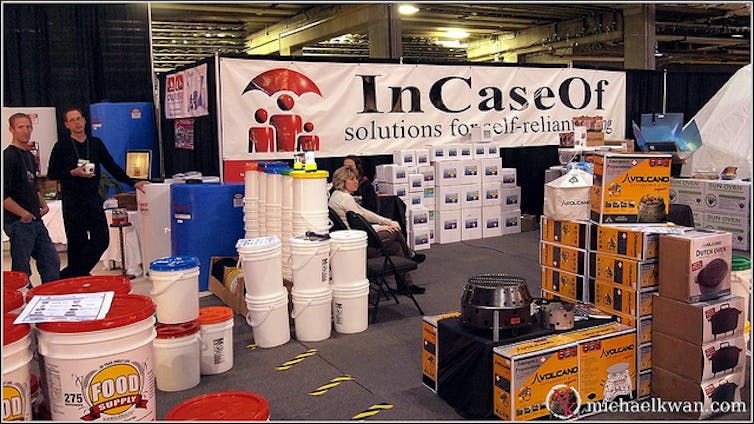
If doomsday should arrive, then apparently I would have little more than a week or two before I starved to death or was killed by desperate neighbours scavenging for baked beans.
I took the Doomsday Preppers online test and, with a lowly score of 14, I’m clearly not taking the threat of the end of the world as we know it seriously enough.
Emergency experts in Australia have recently pointed out that most city dwellers exhibit a degree of “learned helplessness”. We expect emergency services to promptly come to our aid in disaster situations. Few of us have the resources to survive for a mere three days without power and water.
In the face of our increasing disconnect from the natural world and wholesale loss of essential skills that kept our ancestors alive, a number of television programs allow us to watch humans tested in apocalyptic situations from the comfort of our couches.
Doomsday Preppers is an American reality show, now in its third season, that airs on the National Geographic channel. It depicts “ordinary” Americans making elaborate preparations for the demise of civilisation, which they fear will come from terrorism, nuclear incidents, war, disease, rising sea levels and even more improbable causes, such as geomagnetic reversal, polar shifts, or Chinese financial takeover.
The preppers do not trust that the United States government will help them in dire circumstances. After the highly criticised government response to Hurricane Katrina in 2005, there is admittedly an element of sense in wanting to be self-sufficient in the event of a widespread catastrophe.
Preppers profiles people who plan to survive independently for closer to three years than three days. They build food production systems in their yards, stockpile canned goods and preserves, construct underground bunkers, devise ways to recycle their bodily waste, and equip “bug-out” vehicles in case of the need to evacuate.
Weapons training and an arsenal of guns and ammunition are also essentials for protection against all of the now-homeless people who mocked the eccentrics who were building bunkers before the disaster.
In 2009, the Discovery Channel attempted to simulate life after the apocalypse with The Colony, a filmed “experiment” in which ten colonists, including a nurse, doctor and engineers, were charged with “surviving” and rebuilding the systems we depend on in a Los Angeles warehouse. Extras were even cast as gangs of looters to add a sense of scripted authenticity.
Fictional representations of the apocalypse, such as the zombie series The Walking Dead (based on a comic book series), also prompt those of us whose biggest survival challenge arises when the supermarket is closed for a public holiday to consider how capable we would be in a world without order.
The beheading, shooting, stabbing and impaling of zombies is often reduced to a perfunctory formality. However, sourcing a pregnancy test or baby formula in an America where manufacturing has ceased and shops have been cleared of supplies is a particular challenge.
In The Walking Dead, cities are rendered nearly uninhabitable as the services required to maintain them, and support the lives of people within them, have disappeared. Survival largely requires a return to small towns and country areas where crops can be grown and animals can be farmed.
The prison that has proven to be a place of comparative sanctuary for the protagonists in the past two seasons also has a limited supply of provisions, and hunting and gathering in the woods, is essential to supplement their diet and eke out supplies.

The expert hunter and tracker in the series is Daryl, a Southern character who could be categorised as a “redneck”. His skills, which would be devalued as indicators of his class in contemporary culture, are crucial to the group’s survival. This is reflected in a meme that jokes “Everybody makes fun of the redneck until the zombie apocalypse”.
These television series imagine various dystopias in which being capable in everything from self-defence, to food production, mechanical repair, and first aid is necessary for survival.
In a time in which meat arrives in the home in plastic packs, broken items are discarded rather than repaired, and power blackouts are lit by the glow of iPads, our collective ability to function in a world devoid of technology has perhaps never been more limited.
Though Doomsday Preppers invites the viewer to see its subjects who imagine impending doom as somewhat paranoid, The Walking Dead valorises skills that are largely long-forgotten by most who lives in cities.
While the comforts of modern civilisation mean we do have to think about fending for ourselves, picturing what would happen if it did collapse is a reminder of how helpless most of us would become.
